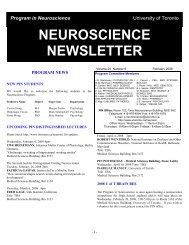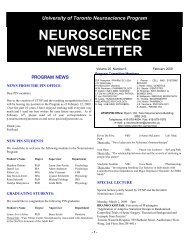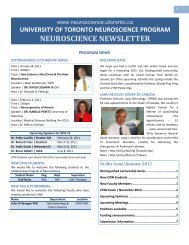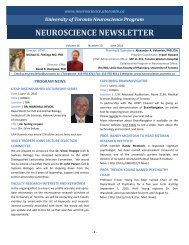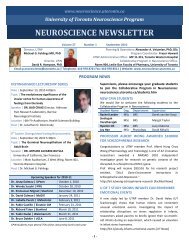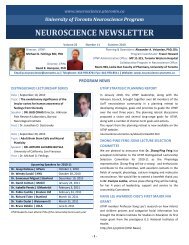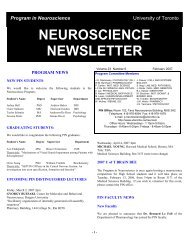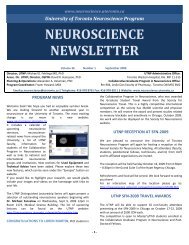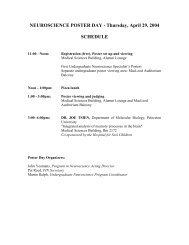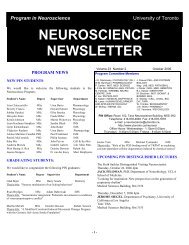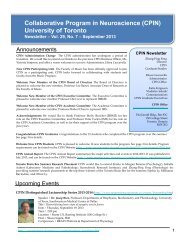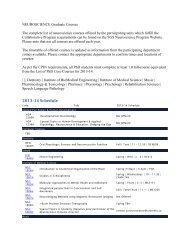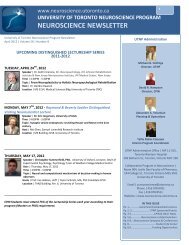Vol.27 Num(2) - Program in Neuroscience, University of Toronto
Vol.27 Num(2) - Program in Neuroscience, University of Toronto
Vol.27 Num(2) - Program in Neuroscience, University of Toronto
You also want an ePaper? Increase the reach of your titles
YUMPU automatically turns print PDFs into web optimized ePapers that Google loves.
applications from <strong>in</strong>vestigators to conduct research pilot<br />
studies <strong>in</strong>to the causes, diagnosis, treatment, prevention and<br />
cure <strong>of</strong> autism spectrum disorders. Trailblazer Grants: The<br />
Trailblazer Award mechanism will support highly novel "out<br />
<strong>of</strong> the box" autism-relevant research that addresses<br />
significant roadblocks or that can open new avenues to<br />
understand<strong>in</strong>g the causes, diagnosis, subtyp<strong>in</strong>g, prevention,<br />
treatments, and cure <strong>of</strong> autism spectrum disorders. The<br />
Trailblazer Award mechanism is designed to fund small<br />
<strong>in</strong>vestigator-<strong>in</strong>itiated high risk/high impact projects that are<br />
potentially transformative. Examples <strong>of</strong> good fits are: 1)<br />
projects that may be too risky for regular research<br />
mechanisms, <strong>in</strong>clud<strong>in</strong>g the Autism Speaks pilot study research<br />
grants, and/or 2) studies that are time-sensitive <strong>in</strong> their<br />
ability to leverage an exceptional opportunity for conduct<strong>in</strong>g<br />
highly <strong>in</strong>novative and relevant ASD research. Deadl<strong>in</strong>e: Roll<strong>in</strong>g<br />
Submissions (see RFA).<br />
Alzheimer Society <strong>of</strong> Canada : Research Grants, Research<br />
Tra<strong>in</strong><strong>in</strong>g Awards.The ASR <strong>Program</strong> focuses on two research<br />
streams, Biomedical, and Quality <strong>of</strong> Life. The Biomedical<br />
Stream provides fund<strong>in</strong>g for research <strong>in</strong>to basic biological<br />
mechanisms related to bra<strong>in</strong> changes associated with the<br />
disease, and <strong>in</strong>to the identification <strong>of</strong> therapeutic agents to<br />
combat the disease. Applications deal<strong>in</strong>g, for example, with<br />
bra<strong>in</strong>-behaviour mechanisms, biochemical changes and<br />
molecular genetics are processed <strong>in</strong> the Biomedical stream.<br />
While the Quality <strong>of</strong> Life stream is concerned with all aspects<br />
<strong>of</strong> dementia care and support, the Alzheimer Society has a<br />
particular <strong>in</strong>terest <strong>in</strong> the means to improve the way care is<br />
experienced by people with dementia liv<strong>in</strong>g <strong>in</strong> long term care<br />
homes, and their families. The research most favoured will be<br />
based on a person-centred philosophy, specifically the study<br />
<strong>of</strong> <strong>in</strong>terventions that support person-centred care <strong>of</strong> people<br />
with dementia liv<strong>in</strong>g <strong>in</strong> long term care homes.Deadl<strong>in</strong>e for<br />
Submissions: November 19, 2010.<br />
American Foundation for Suicide Prevention (AFSP) :<br />
Research Grants <strong>Program</strong>. All AFSP research grants are<br />
designed to support research on suicide from a variety <strong>of</strong><br />
discipl<strong>in</strong>es, <strong>in</strong>clud<strong>in</strong>g psychiatry, medic<strong>in</strong>e, psychology,<br />
genetics, epidemiology, neurobiology, sociology, nurs<strong>in</strong>g,<br />
health services adm<strong>in</strong>istration, and many others. Grants are<br />
not <strong>in</strong>tended to support the development or implementation<br />
<strong>of</strong> prevention programs, educational programs, treatments,<br />
or other <strong>in</strong>terventions that do not have a significant research<br />
component. Deadl<strong>in</strong>e for all Grant Mechanisms: December<br />
1, 2010.<br />
American Academy <strong>of</strong> Otolaryngology - Head and Neck<br />
Surgery (AAO-HNSF) : Centralized Otolaryngology Research<br />
Efforts (CORE) Grant <strong>Program</strong>. The Plastic Surgery<br />
Educational Foundation (PSEF) and the AAO-HNSF <strong>of</strong>fer the<br />
PSEF/AAO-HNSF Comb<strong>in</strong>ed Grant to support a collaborative<br />
PSEF/AAO-HNSF research project. Applications must show<br />
evidence <strong>of</strong> a collaborative effort between the two surgical<br />
specialties. Deadl<strong>in</strong>e for Letters <strong>of</strong> Intent: December 15,<br />
2010.<br />
National Bra<strong>in</strong> Tumor Society (NBTS) : Systems Biology<br />
Approaches to Bra<strong>in</strong> Tumor Research - Stage 1. NBTS<br />
believes <strong>in</strong> the potential positive impact <strong>of</strong> bra<strong>in</strong> tumor<br />
research that embraces a systems biology perspective at all<br />
levels, from a bottom up approach to a top down approach.<br />
NBTS looks to encourage a systems biology perspective <strong>in</strong> any<br />
area <strong>of</strong> bra<strong>in</strong> tumor research rang<strong>in</strong>g from signal transduction<br />
to immunotherapeutics to mathematical algorithms for high<br />
throughput test<strong>in</strong>g <strong>of</strong> therapeutic hypotheses. NBTS<br />
recognizes the challenges <strong>in</strong> develop<strong>in</strong>g creative and<br />
<strong>in</strong>novative research programs from this perspective,<br />
particularly for the bottom up approach. As such, NBTS will<br />
employ a two-stage grant process. Deadl<strong>in</strong>e for Stage 1<br />
Applications: December 17, 2010.<br />
SUBMISSION & CONTACT INFORMATION<br />
Email: p.neuroscience@utoronto.ca | Fax: 416-978-8511 Attn: Frazer<br />
Howard | Submissions to the newsletter must be made by the 25th<br />
<strong>of</strong> the preced<strong>in</strong>g month. Previous issues <strong>of</strong> the newsletter are posted<br />
on our website at: http://www.neuroscience.utoronto.ca/newsletter<br />
If you no longer would like to receive this newsletter, please contact<br />
p.neuroscience@utoronto.ca with subject l<strong>in</strong>e “unsubscribe from<br />
UTNP Newsletter”<br />
- 8 -



